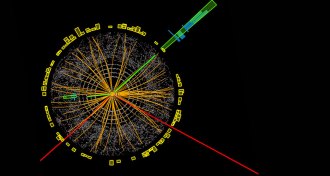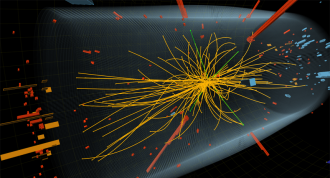News
-
 Space
SpaceDark matter filament illuminated
Astronomers visualize a connection in a shadowy cosmic network that is thought to pervade the universe.
By Devin Powell -
 Physics
PhysicsHiggs found
The Higgs boson, the last particle in physics’ standard model, falls into place, opening new windows to explore in the universe.
-
 Humans
HumansApocalypse, not so fast
Guatemalan find suggests mention of a date far in the future served a Maya king’s immediate needs.
By Bruce Bower -
 Particle Physics
Particle PhysicsThe Higgs Boson Search
Rumors — and excitement — have escalated about the latest news on the search for the Higgs boson, a particle that may explain why matter has mass.
By Science News -
 Particle Physics
Particle PhysicsPhysicists bet they’re homing in on Higgs
In its last report, an Illinois lab presents data suggesting the Higgs particle could exist.
-
 Life
LifeAll dinosaurs may have had feathers
Well-preserved fossil sports long, fine plumage and a bushy tail.
By Meghan Rosen -
 Health & Medicine
Health & MedicineSome brains may be primed for pain
When people keep hurting long after an injury heals, a process similar to addiction may be at work.
-
 Animals
AnimalsClimate adaptation may be a family affair
Newborn coral reef fish can cope with changed water conditions if their parents have already adjusted.
By Janet Raloff -
 Genetics
GeneticsConvenience shoulders tomato taste aside
Decades of breeding for uniform color in unripe fruit may accidentally have reduced flavor.
By Susan Milius -
 Archaeology
ArchaeologyOldest pottery comes from Chinese cave
New dates show that East Asian hunter-gatherers fired up cooking vessels 20,000 years ago.
By Bruce Bower -
 Animals
AnimalsDinosaur debate gets cooking
A key piece of evidence for cold-blooded dinosaurs, growth lines in bones, has also been discovered in a set of warm-blooded animals.
By Meghan Rosen -
 Health & Medicine
Health & MedicineMale contraceptive shows promise
Two hormones in gels applied to the skin effectively lower sperm counts, a study finds.
By Nathan Seppa